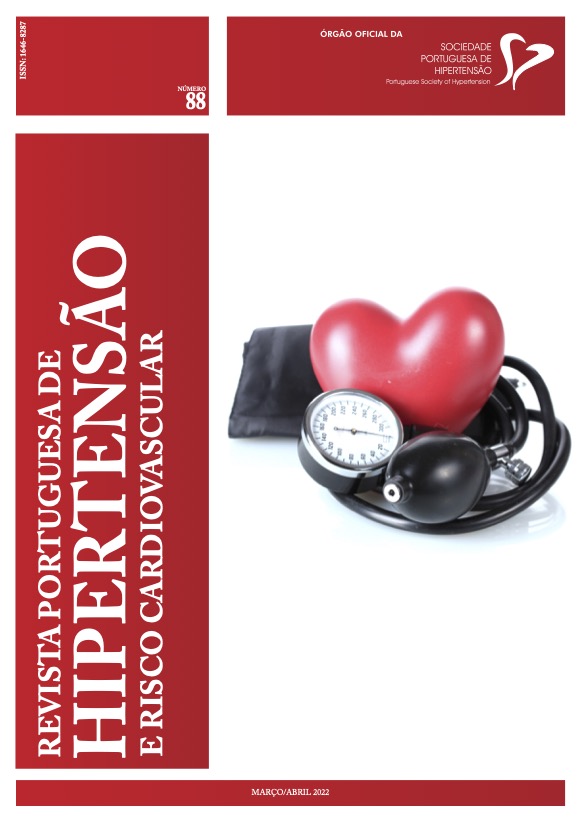HYPERTENSION AND POLYPHARMACY: AN EPIDEMIC TO CONTROL
DOI:
https://doi.org/10.58043/rphrc.16Abstract
Introduction: The lack of therapeutic adherence is a common problem in hypertensive patients, resulting in potentially preventable cardiovascular events. Thus, it is urgent to identify the causes as well as areas of improvement.
Methods: A random sample of 178 patients admitted to an internal medicine ward over a year was obtained. In relation to each of these, information was collected regarding age, sex, the existence of a previous diagnosis of arterial hypertension and the performance of polypharmacy ambulatory, which is defined by taking 5 or more pharmaceutical compounds.
Results: We found a high number of hypertensive patients, 110 cases, corresponding to 61.8% of the total sample. In addition, there was a statistically significant relation - Pearson’s chi- square test with a significance of 0.005 - between hypertension and polypharmacy. Discussion: In the analysis of a sample composed of patients with multiple comorbidities and polypharmacy, we found that hypertension has a particularly significant impact on this association. Combined drug treatments in these patients may contribute to decrease therapeutic complexity and enhance adherence, in addition to their physiological benefits.
Conclusion: Polypharmacy is a common problem in hypertensive patients. Combined drug treatments established ad initium, as recommended by the most recent guidelines, can contribute to therapeutic simplification and adherence.
Downloads
References
Tomaszewski M, White C, Patel P, Masca N, Damani R, Hepworth J, et al. High rates of non-adherence to antihypertensive treatment revealed by high-performance liquid chromatography-tandem mass spectrometry (HP LC- MS/MS) urine analysis. Heart. 2014;100(11):855-61.
Mazzaglia G, Ambrosioni E, Alacqua M, Filippi A, Sessa E, Immordino V, et al. Adherence to Antihypertensive Medications and Cardiovascular Morbidity Among Newly Diagnosed Hypertensive Patients. Circulation. 2009;120(16):1598-605.
Abegaz TM, Shehab A, Gebreyohannes EA, Bhagavathula AS, Elnour AA. Nonadherence to antihypertensive drugs: A systematic review and meta-analysis. Medicine (Baltimore). 2017;96(4):e5641-e.
Rahmawati R, Bajorek BV. Self-medication among people living with hypertension: a review. Fam Pract. 2017;34(2):147- 53.
Conn VS, Ruppar TM, Chase JA, Enriquez M, Cooper PS. Interventions to Improve Medication Adherence in Hypertensive Patients: Systematic Review and Meta-analysis. Curr Hypertens Rep. 2015;17(12):94.
Williams B, Mancia G, Spiering W, Agabiti Rosei E, Azizi M, Burnier M, et al. 2018 ESC/ESH Guidelines for the management of arterial hypertension: The Task Force for the management of arterial hypertension of the European Society of Cardiology (ESC) and the European Society of Hypertension (ESH). European Heart Journal. 2018;39(33):3021-104.
Chow CK, Teo KK, Rangarajan S, Islam S, Gupta R, Avezum A, et al. Prevalence, Awareness, Treatment, and Control of Hypertension in Rural and Urban Communities in High-, Middle-, and Low-Income Countries. Jama. 2013;310(9):959-68.
Cutler RL, Fernandez-Llimos F, Frommer M, Benrimoj C, Garcia-Cardenas V. Economic impact of medication non- adherence by disease groups: a systematic review. BMJ Open. 2018;8(1):e016982.
E S. Adherence to long-term therapies: evidence for action. Geneva: World Health Organization. ; 2003.
Unger T, Borghi C, Charchar F, Khan NA, Poulter NR, Prabhakaran D, et al. 2020 International Society of Hypertension Global Hypertension Practice Guidelines. Hypertension. 2020;75(6):1334-57.
Herrera PA, Moncada L, Defey D. Understanding Non-Adherence From the Inside: Hypertensive Patients’ Motivations for Adhering and Not Adhering. Qual Health Res. 2017;27(7):1023-34.
Webster R, Salam A, de Silva HA, Selak V, Stepien S, Rajapakse S, et al. Fixed Low-Dose Triple Combination Antihypertensive Medication vs Usual Care for Blood Pressure Control in Patients With Mild to Moderate Hypertension in Sri Lanka: A Randomized Clinical Trial. Jama. 2018;320(6):566-79.





